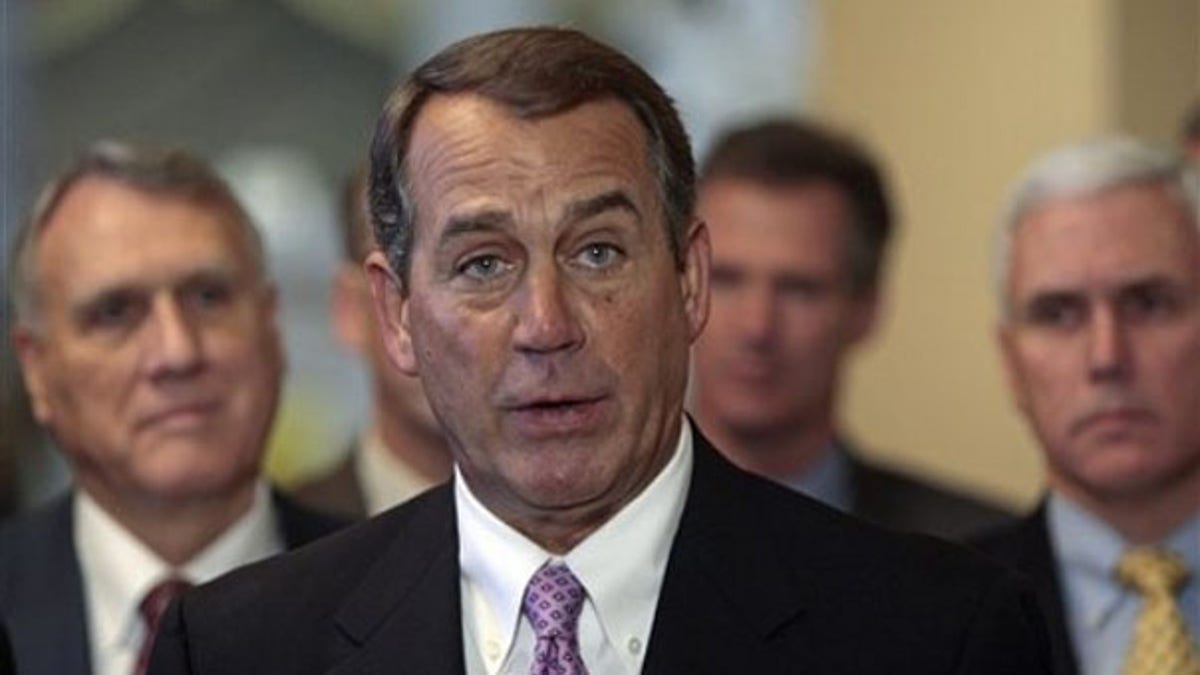
House Minority Leader John Boehner speaks to reporters, alongside other House and Senate lawmakers, on Capitol Hill March 18. (AP Photo)
Democrats were "giddy" Thursday after they received estimates showing that their latest health care bill clocks in at under $1 trillion -- but there's another hurdle ahead that Republicans insist could be deadly.
House and Senate Republican leaders were preparing for battle, huddling in a closed-door meeting on Capitol Hill to figure out ways to stop the bill in its tracks, even as it appeared to gain momentum. The preliminary estimate from the Congressional Budget Office showing the bill would cost $940 billion set up a potential floor vote for Sunday.
"We're going to continue to work closely together and to do everything that we can do to make sure that this bill never, ever, ever passes," House Minority Leader John Boehner said.
The Republican strategy is to exploit a potential problem with the package of changes House Democrats want to see passed in exchange for their vote on the Senate-approved health care bill.
For many Democrats, the assumption that the House and then the Senate will pass the "side-car" package of fixes is critical to their support of the original Senate bill. House Democrats don't like a lot of things about the Senate bill, including a tax on high-cost "Cadillac" insurance plans, which could eat into union benefits.
So included in the package of changes would be a compromise between the White House and congressional Democrats to put off that tax until 2018, as opposed to 2013.
But Republicans argue that the adjustment would run afoul of a congressional rule that says "reconciliation" -- which is the legislative process Democrats want to use to usher the bill through the Senate with just 51 votes, instead of 60 -- cannot be used to tweak Social Security.
Because the tax on "Cadillac" insurance plans is projected to bring in revenue to Social Security, any change to that tax would presumably affect Social Security.
This is a clear violation, GOP sources told Fox News. And Senate Republicans plan to take to the floor to hammer this potential roadblock.
Their strategy appears to be to scare wavering House Democrats into voting against the original Senate bill. If Republicans can make the case that the "side-car" bill, or at least key parts of it, will never be passed, then they hope a number of fence-sitting Democrats will not want to go on record in support of a Senate bill they see as seriously flawed.
Senate Minority Leader Mitch McConnell hinted at this approach when he said the plan is for the bill to be defeated outright in the House.
"Our plan is for it not to come to the Senate," he said.
In the meantime, Senate Democrats are trying their hardest to reassure their House colleagues who are afraid the fix-it bill will never be taken up.
Senate Majority Leader Harry Reid wants to send a letter of assurances to House Democrats with at least 51 signatures, the number needed for passage of a reconciliation bill.
"The House wants assurances and we intend to give then assurances," Sen. Charles Schumer, D-N.Y., said.
"We're working on a way to let the House know there are 51 senators who support the reconciliation approach," said Senate Democratic Whip Dick Durbin, D-Ill.
The letter, according to numerous senators, will not be specific as to actual votes secured for reconciliation.
"We talked about the importance of showing strong support for the House," said Sen. Amy Klobuchar, D-Minn., adding that the letter would show "we were generally supporting of moving forward on health care. We think that would be helpful."
Fox News' Trish Turner contributed to this report.












































